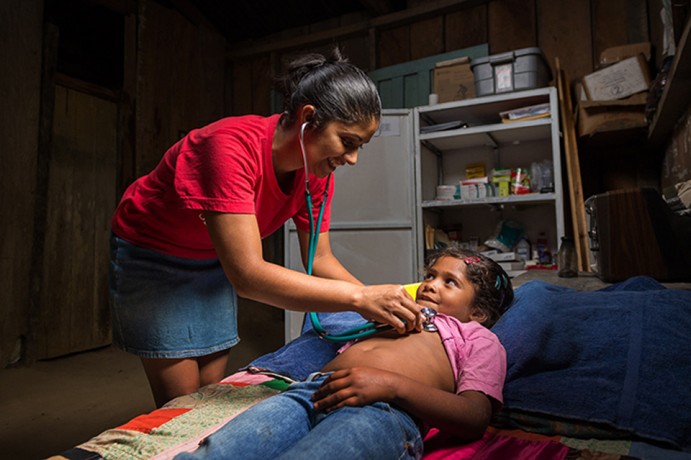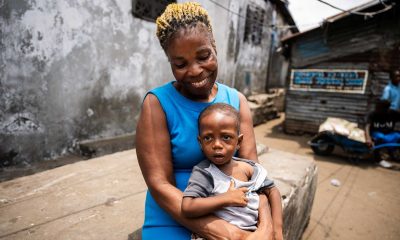Samaritan’s Purse is helping save lives in remote communities in Honduras by training and equipping men and women to identify and treat common, preventable illnesses
Cesar Bueso Rodriguez remembers when his cousin got really sick. Cesar watched him vomit and have trouble breathing for three days. No one in the village knew that his condition was life-threatening, and it required lots of time and money to go down the mountain to the nearest doctor. So his family just hoped and prayed his symptoms would go away.
Cesar’s cousin died. Twelve years later, the 19-year-old still remembers the tragedy and is determined to help stop it from ever happening again. He became a Village Samaritan, a volunteer health worker in a new Samaritan’s Purse program that provides care and medicine in rural communities of Honduras.
We have a nebulizer here in the community now because of the Village Samaritan program,” Cesar said. “We could have saved my cousin’s life.”
Every four seconds, a child in the developing world dies of easily preventable or treatable causes before reaching his or her 5th birthday. In addition, one mother dies every minute due to a lack of medical care. Many of the medicines necessary to prevent these deaths are available in urban centers, but not to rural villages.
Samaritan’s Purse is training volunteer health care workers to recognize the warning signs of common illnesses. The Village Samaritans live in the communities, and go door-to-door to check on their neighbors. They prescribe basic medicine such as ibuprofen for fevers, hydration fluids for diarrhea, and antibiotics for infections.
“We have the highest numbers of people dying of preventable diseases in these communities,” said Dr. Lul Janania, program manager for the Village Samaritan. “The biggest problems I see are the lack of education and a lack of medical care close to the home. I think this program will make a big difference because the volunteers can do the work in their own community.”
The program is starting in a few villages in Honduras, and could expand to communities around the world.
Cesar was one of the first seven people to receive training. He is providing health care in Caballo de Piedras.
“I became a Village Samaritan because of the needs in my community,” he said. “Growing up, what I saw was diarrhea, fever, and stomach problems. I wanted to be a part of the solution.”
Cesar does not remember ever receiving help from the government or other groups in the village.
“We never had any hope of getting any type of medical care here locally,” Cesar said. “When Samaritan’s Purse came over a year ago, we were just happy someone from the outside was taking an interest in our community.”
Under the supervision of Dr. Janania and Rosario Flores, the nurse who manages the program, Cesar was trained in first aid, how to recognize diseases, give medicine and monitor vitals like blood pressure. He also learned how to teach sanitation classes in schools to prevent illness, as well as how to share the Gospel of Jesus Christ.
“Through the devotions in the training, I learned how to find things in the Bible, I learned new stories, and how to know God,” he said.
The first child Cesar helped was 3-year-old Kevin Bautista. In June, soon after Cesar completed the training, Kevin woke up in the middle of the night with a fever and vomiting. Shoe box gifts from Operation Christmas Child were being distributed the next day. Kevin wanted to go so badly that his mother took him even though he was ill.
During the presentation of the gift-filled shoe boxes, Kevin was sweating with a fever and was very weak. As soon as the program was over Kevin’s mother, Maria, took him to see Cesar. His fever broke withing just hours of taking medicine and rehydration fluids.
“We feared that he could die,” Maria said. “When a child gets a fever, we pray because there is no place to get medicine close by. If Cesar had not been here, we would have had to go into town. If we didn’t have the money, we would need to find a ride into town.”
The closest clinic is in Santa Lucia, up to eight hours away. Families like Maria’s must leave their homes at 3 a.m. just to catch the first bus if they don’t have other means of transportation.
Even if they do get to the clinic, the nurse who works irregular hours may not be present, and is frequently in short supply of much-needed medicines. If a case is critical, they must travel another hour and a half to get to the hospital in Progresso. Even if the patients have enough money to reach the clinic or hospital, they often can’t afford the care and medicine prescribed for treatment.
Thanks to the Village Samaritan program, now Maria and her family have the comfort of knowing that help is minutes away. Kevin is still well and continues to happily play with the toys he received in his shoe box.
In Agua Frio, another of the first four communities to participate in the program, Village Samaritan Elsa Castro is finding new hope as well.
“I give thanks to Samaritan’s Purse and to God,” she said “You have given us the strength to confront the different problems here. My desire is to see Agua Frio better than it is, so I feel stronger and more committed every day. I take the story of the Good Samaritan to heart.”
If a situation is ever too critical for the Village Samaritans to handle, they call the nurse manager, Rosario Flores, for support.
She also has an ambulance in her backyard in case of an emergency. It typically costs $50 to transport a patient, about half the monthly wage of the average Honduran family in these small villages. So driving an ill person to the health center for no cost helps them immensely.
Rosario has used it to transport a man with a tooth infection and a woman who had arthritis and could not walk.
Her job also includes coordinating community workshops. She helped lead a lecture on prenatal and postnatal care for the pregnant women in the villages and helped transport them to the doctor to get tested for any health issues.
Rosario says she feels more useful now that she works with Samaritan’s Purse and feels fulfilled since she can also share the Gospel with the families she helps.
“I feel more confident now when I get a sick person because I have the resources to take them to the doctor,” she said. “I can also give them many words of encouragement from the Bible. Because of the books from Samaritan’s Purse, they have given me ideas on how to share the Gospel with the people.”
Dr. Janania, who has been leading the trainings in San Pedro Sula, echoes Rosario’s passionate beliefs about spreading the Gospel in these communities as well as saving their lives from preventable diseases.
“The most important thing is to use health to bring the Gospel and to give them an opportunity for salvation,” she said. “True change only comes through believing in Jesus Christ.”






